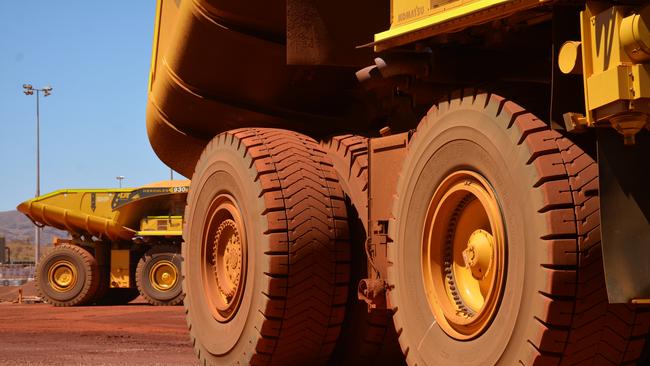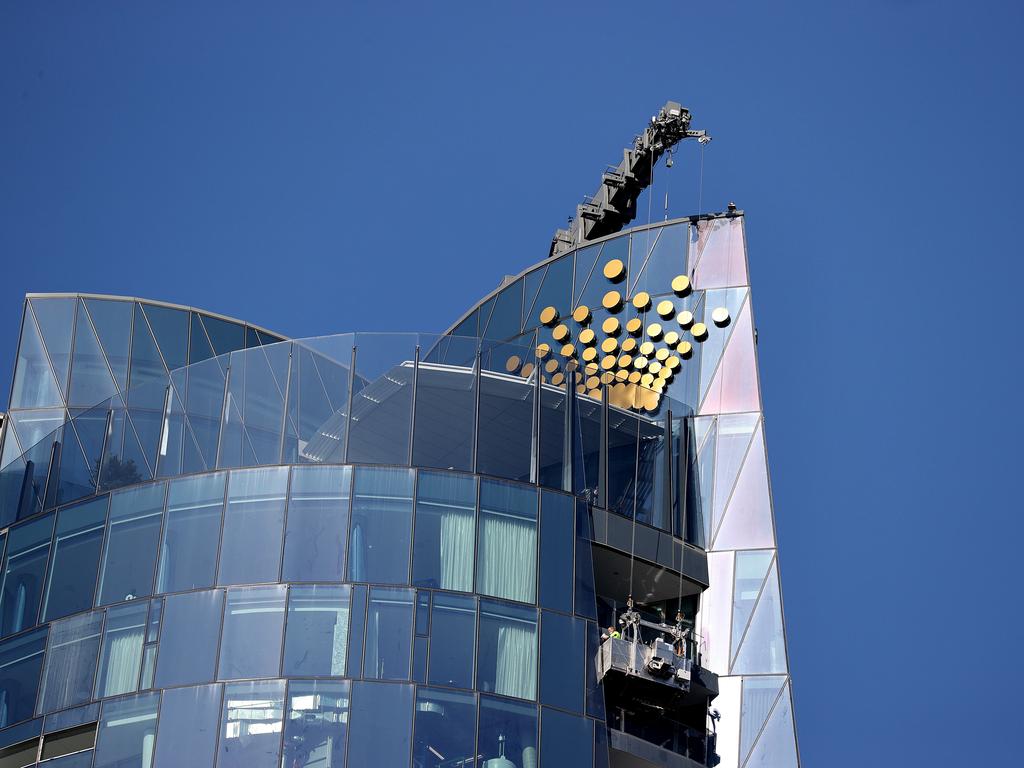Warning on prices as BHP splashes cash
BHP has warned high commodity prices may not last for long as supply disruptions caused by the Omicron wave recede, but delivered another cash-splash to shareholders.

BHP has warned current high commodity prices may not last for long as supply chain disruptions caused by the Omicron wave recede, while delivering another cash-splash to shareholders on Tuesday.
BHP declared a record $US1.50 interim dividend in its half-year results, after booking a $US9.44bn ($13.3bn) profit buoyed by a surge in the price of key commodities.
BHP’s after-tax profit lifted 144 per cent from $US3.88bn in the first half of the previous financial year on the back of stronger prices for iron ore, coal, oil and copper.
But the company warned it expected pricing for its major commodities to be “tilted modestly downwards” over the next 12 months – although it does not expect any major price corrections in the near term.
The iron ore price is still hovering at just under $US150 a tonne, with metallurgical coal prices still at extraordinary levels above $US430 a tonne, copper at $US9835 a tonne and oil nearing $US100 a barrel.
BHP vice-president of market analysis and economics, Huw McKay, said in his half-year outlook that “directional risks to prices across our diversified portfolio are tilted modestly downwards”.
“(That is) a view that relies in part on the elevated price deck we face in many commodities at the outset of this calendar year, and a general belief that the most severe supply disruptions will ease, progressively, as the year unfolds: weather, Covid-19 and policy permitting,” he said.
“That said, very short-term downside is arguably limited, with operating cost curves having moved higher and steepened in the midst of the global inflation shock. This has raised real-time price support above pre-pandemic levels in many of the commodities in which we operate.”
Dr McKay did not give specific short-term guidance on BHP’s view of individual commodities. However, he noted the remarkable turnaround in BHP’s coking coal division – which on Tuesday booked a $US2.8bn improvement on its result from the first half of the previous financial year – faced choppy waters ahead.
“Going forward, despite the recent exuberance, while natural trade flows are inhibited the metallurgical coal industry faces a difficult and uncertain period ahead,” he said. BHP’s half-year profit narrowly beat consensus analyst expectations, booking underlying earnings before tax, interest, depreciation and amortisation of $US18.46bn.
Consensus analyst expectations had tipped a $US1.24 a share dividend on the back of underlying EBITDA of $US18.32bn.
The strong result backs up a transformative year for CEO Mike Henry, after the company agreed to sell its oil and gas assets to Woodside Petroleum and shareholders voted to end BHP’s decades-old dual-listed structure.
BHP’s Pilbara iron ore operations shrugged off the impact of skilled labour shortages in Western Australia in the first half, lifting shipments in the December quarter to near record levels.
The company’s dominant iron ore division booked underlying EBITDA of $US11.15bn in the first half, after BHP’s mines exported 144 million tonnes of iron ore in the first half of the financial year.
The lift in the export rate came as BHP ramped up output from its new South Flank mine, saying the near-record export rates came despite the impacts of the WA labour shortages and major maintenance campaigns at its rail operations.
Its coal division booked underlying EBITDA of $US2.64bn, up from an underlying $US201m loss in the previous corresponding period, with copper earnings up to $US4.27bn. BHP’s petroleum division – listed as an “asset for sale” in the half-year results – booked underlying EBITDA of $US2.9bn, up from $US2.1bn.
BHP received an average $US113.54 a tonne for its iron ore in the first half of the financial year, up 9 per cent on the first half of the previous financial year.
But average metallurgical coal prices were 166 per cent ahead of the equivalent period, at $US259.71 a tonne, with thermal coal prices more than triple previous levels at $US137.68 a tonne.
BHP sold LNG at an average $US15.10 per thousand standard cubic feet (Mscf), up 239 per cent, with crude oil sale values up 79 per cent, and even nickel prices up an average 30 per cent in the half.
BHP’s statutory profits were hit by $US1.2bn in one-off charges, after taxation was taken into account. The company flagged in January it expected to take a $US400m to $US450m ($555m to $625m) impairment as it wrote off deferred tax assets in the US it wouldn’t be able to claim after the sale of its petroleum division to Woodside petroleum later this year.
It also said it expected to take a $US425m to $US475m hit on depreciation, amortisation and impairments to its Pilbara assets related to the commissioning of South Flank and a lift in closure costs at its Yandi mine.
BHP booked a $US822m charge related to the 2015 Samarco tailings dam failure.
On Tuesday BHP boss Mike Henry added his voice to the chorus of senior corporate leaders calling on the WA government to open the state’s borders, as the company delivered shareholders a record interim dividend on the back of a strong half-year profit.

Even though BHP warned in January it faced a potential production hit in its iron ore division if borders were reopened on February 5, a commitment WA Premier Mark McGowan subsequently reneged on, Mr Henry told reporters on Tuesday he believed the time had come for the state to open for travel from the eastern states.
“Clearly governments are needing to make tough judgments about these policies but I think everybody, including the WA government, would recognise that at some point things have to return to normal. It’s just a question as to when that happens,” he said.
Mr Henry said the WA government had done a “very good job” of handling the pandemic, shielding the mining industry from the effects of Covid-19.
“Now with all the learnings that we’ve had, with where Covid is at in terms of the reduced impact of Omicron, we would like to see borders open back open again and for things to start to return to normal. It feels like now’s the time for borders to be opening back up again.”
BHP shares closed down 15c to $48.18 on Tuesday.






To join the conversation, please log in. Don't have an account? Register
Join the conversation, you are commenting as Logout